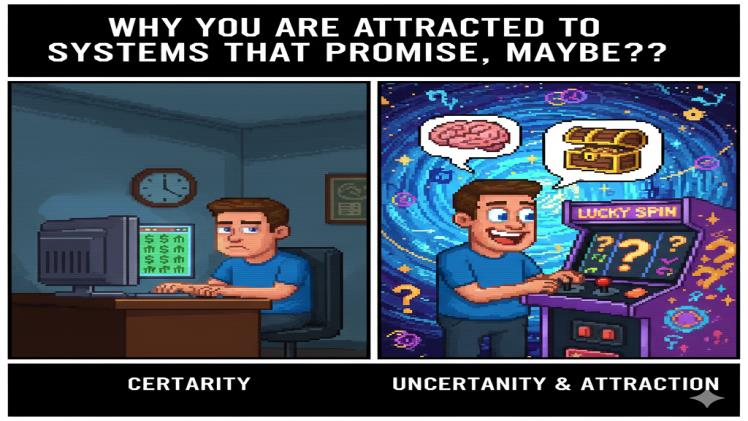 There is something undoubtedly magnetic in the word. It is on the border of certitude, and teasing us with possibility, it holds in suspense a reward that we may, or may not attain–but perhaps will not. We are always playing around with the unknown when we open a box of mystery in a game or when we want to know whether we have received good news on social media. And as it happens, there is a reason behind it —a combination of neuroscience, behavioural tendencies, and digital design that explains the feeling of being unable to resist, maybe.
There is something undoubtedly magnetic in the word. It is on the border of certitude, and teasing us with possibility, it holds in suspense a reward that we may, or may not attain–but perhaps will not. We are always playing around with the unknown when we open a box of mystery in a game or when we want to know whether we have received good news on social media. And as it happens, there is a reason behind it —a combination of neuroscience, behavioural tendencies, and digital design that explains the feeling of being unable to resist, maybe.
The Allure of Uncertainty
It is hardwired in human beings to see possibility. Our brains tend to take a gamble, however slim, that something thrilling may occur when it is put before a certain one. This is not mere idle imagining, but it is deeply entrenched in our reward systems. The anticipation of an unpredictable event triggers the release of dopamine— the very neurotransmitter that drives pleasure, motivation, and, indeed, some degree of obsession.
This is further enhanced in daily systems. Consider the lottery, unexpected sales or even the mere process of scrolling through notifications. Every ping has a potential: a message, a win, a compliment or a new opportunity. It is something that will draw our attention — and make us come back.
The Brain: The Reason Uncertainty is Pleasurable.
A very interesting explanation is neuroscience. Dopamine is not only responsive to rewards but also to reward anticipation. The brain is more energized by the prospect of a good result than by the result itself. This is especially evident in the so-called near-miss effect, the feeling of near-victory or near-success that can be stronger than actual victory.
Cognitive biases are also effective. Our decision-making tends to be biased towards riskier, more repetitive choices when we are exposed to variable rewards — a system in which outcomes are unpredictable. It is what powers most digital systems aimed at keeping users engaged: the uncertainty triggers a dopamine loop that leads to further engagement, some of which is even contrary to logical thought, you can justify on trusted online casino.
Maybe in the Digital World
The idea of uncertainty has been widely exploited in the digital world. Places, applications, and games use it to keep the attention. Changing rewards, instant reward gratification and decision fatigue are all potential contributors to make experiences stimulating and addictive.
It can be seen in a vivid example of online casinos, which do not need to think about gambling per se. An example is Take National Casino Czech. Although it is a licensed online casino, it also exemplifies the tenets of online interaction ideally. Randomization, immediate feedback, and visualization show how the attraction to uncertainty in human beings is translated into behavioural changes. It is not merely about winning; it is about the excitement of the random adventure and the influence of thought biases on every decision.
The same dynamics are in play even outside of gaming. The same behavioural mechanics are used in social media alerts, streaming services that forcefully feed recommended content, and applications that randomly give check-in rewards. Every encounter draws on our instinctive interest in possibility and pushes us to re-engagement.
Expert Perspective
Both behavioural economists and psychologists report that the interest in uncertainty is ancient and contemporary. Since, in the era of evolution, it was essential to avoid the unpredictable at any cost, in the current digital environment, the stimulation of possibilities fuels the brain. Scholars point out that these behavioural patterns are not necessarily bad; they can empower users to be more conscious of how systems can exploit them.
An online space organized according to the principle of variable rewards and immediate satisfaction is a successful reflection of the brain’s natural propensity. Identifying triggers, dopamine loops, cognitive biases, and decision fatigue helps explain why certain systems are so easy to be fascinated by. Even in communication with a platform like National Casino Czech, the actual results are not as important as the combination of uncertainty, reward, and involvement.
The given version incorporates your keyword in its own rhythm; the tone is rather professional but friendly, and the discussion remains focused on gambling-related behaviour without actually encouraging gambling. It is school-like, easy and even a bit frivolous.